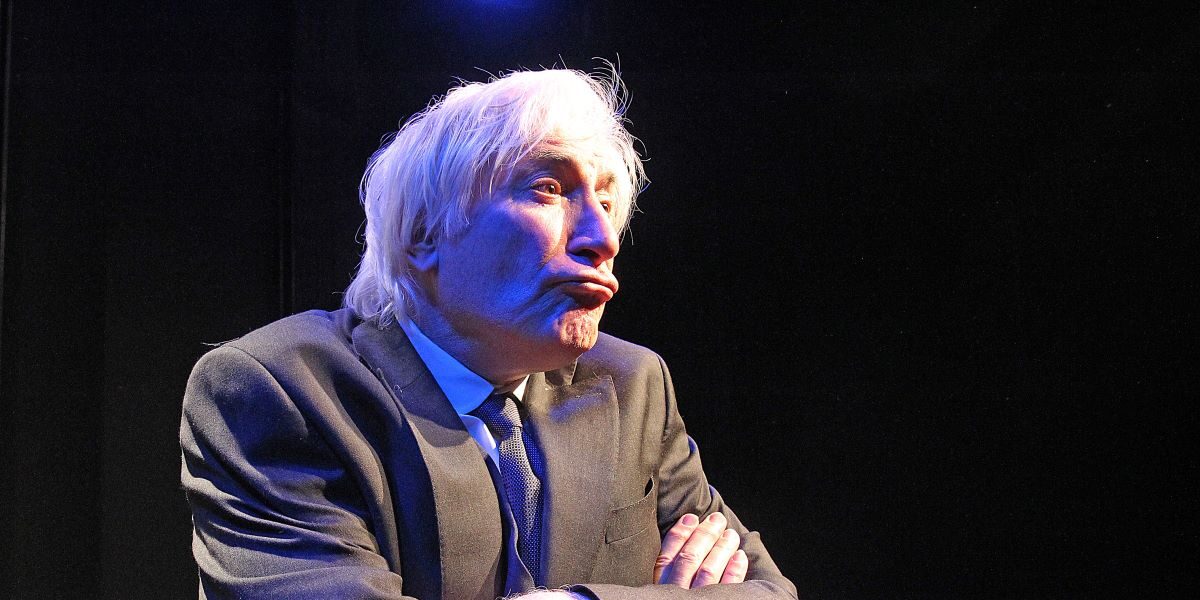This one-man show by Jack Klaff was first aired as far back as 1983, and now returns to the Finborough for a month to mark the precise centenary of Kafka’s death. On one level it is clear ‘tour de force’ – of both research, condensation and performance; but it does require a high level of knowledge of the subject matter to land with full impact, which may make it a more difficult show for the uninitiated.
Klaff mixes up Kafka’s story and his often fraught family and personal life, with excerpts from his writings, some well known, but others not. We also get to hear from Max Brod, Kafka’s friend and literary executor, from his notorious father Hermann Kafka, his sisters, and a number of his lovers. Equally, a huge range of later commentators and historical contemporaries deliver their judgements – Brecht, Einstein, Harold Pinter, Alan Bennett, Orson Welles, and even David Foster Wallace – just to name a few. All testify to the importance of Kafka to the creation of literary modernism. There is also a very amusing and telling section devoted to taking down the excesses committed around the often meaningless and pretentious term ‘Kafkaesque’.
The fact that it was a sustained and structured segment which registered so well testifies to the strengths and weaknesses of the show. When the thought and its dramatic embodiment are fully developed, as also, for example in a brilliant and disturbing portrayal of the death of Josph K from ‘The Trial’, then the results are compelling. But in so many of the vignettes, the coverage is really too breathless to register with full weight and impact. Less would be more, even though you can understand Klaff’s desire to cram in as much as possible when the materials are so rich. As as a result, though there are many incidental highs, the lack of a governing structure and a clearer organising principle makes it all hard to follow at times.
It feels somewhat churlish to say this, when the performance itself is so impressive. Klaff is alone on stage with a single stool, just wearing a grey suit and with the back wall of the theatre in the same colour. The textures and passion of the evening are entirely self-generated through a wide gamut of voices and gestures. Even when I was not entirely clear who the character was, the person was always memorably differentiated. He is a bravura performer who can still galvanise and enthrall an audience. And once I had read the materials contained in the excellent programme, a lot was clearer, particularly on Kafka’s own relationship to theatre.
I learned a lot about Kafka from this show – he came over as a warmer, more rounded and much more personally humorous person than I had appreciated. I also understood better the difficult hand Max Brod had to play in managing his fragmented legacy, and the self-interested ways in which many others have sought to appropriate his example and work for their own purposes. When his work was allowed to speak in meaningful segments, its continuing power to challenge and amuse came across powerfully as well.
The central issue, though, is that any one or even two of these three strands would have made a wonderful evening in the hands of Jack Klaff; but as things stand they jostle and crowd and muffle each other to mutual disadvantage. Still, I would say to Kafka afficianados that this is not a show to miss. In a moment of unscripted audience participation, someone called out ‘Like this show’, in the section on Kafakesque. This was unfair: Klaff’s Kafka is the real deal despite its uneasy and unsettling format.
Devised, Written & Performed by Jack Klaff
Director: Colin Watkeys
Photo Credit: Marilyn Kingwill
Until: July 6 2024
85 mins, no interval

